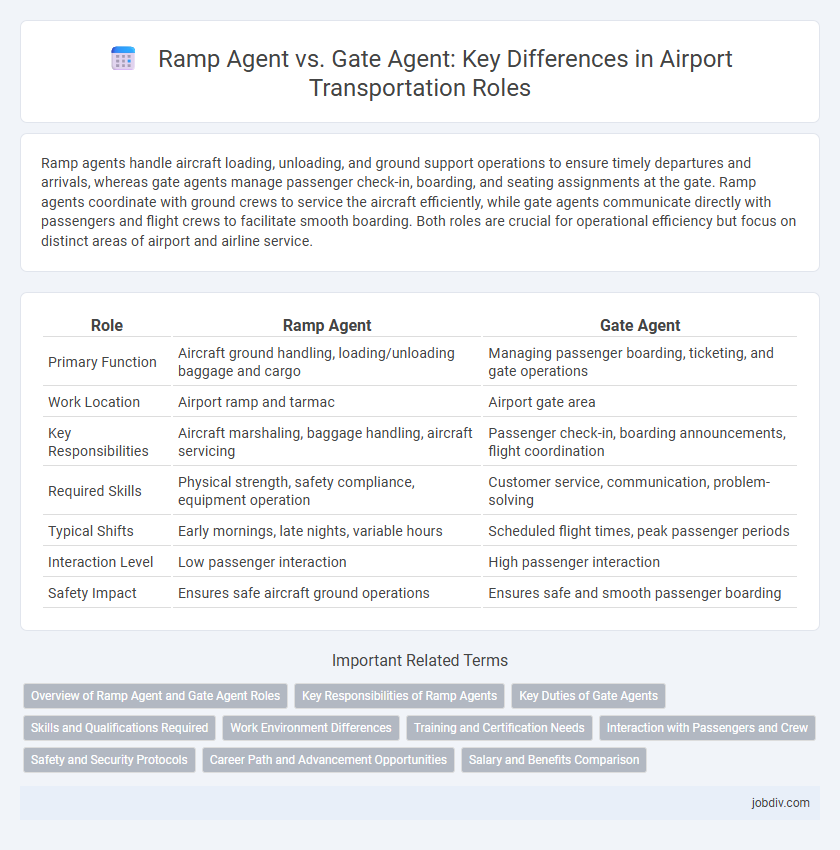Ramp agents handle aircraft loading, unloading, and ground support operations to ensure timely departures and arrivals, whereas gate agents manage passenger check-in, boarding, and seating assignments at the gate. Ramp agents coordinate with ground crews to service the aircraft efficiently, while gate agents communicate directly with passengers and flight crews to facilitate smooth boarding. Both roles are crucial for operational efficiency but focus on distinct areas of airport and airline service.
Table of Comparison
| Role | Ramp Agent | Gate Agent |
|---|---|---|
| Primary Function | Aircraft ground handling, loading/unloading baggage and cargo | Managing passenger boarding, ticketing, and gate operations |
| Work Location | Airport ramp and tarmac | Airport gate area |
| Key Responsibilities | Aircraft marshaling, baggage handling, aircraft servicing | Passenger check-in, boarding announcements, flight coordination |
| Required Skills | Physical strength, safety compliance, equipment operation | Customer service, communication, problem-solving |
| Typical Shifts | Early mornings, late nights, variable hours | Scheduled flight times, peak passenger periods |
| Interaction Level | Low passenger interaction | High passenger interaction |
| Safety Impact | Ensures safe aircraft ground operations | Ensures safe and smooth passenger boarding |
Overview of Ramp Agent and Gate Agent Roles
Ramp agents handle aircraft ground operations including loading and unloading luggage, marshaling aircraft, and performing safety checks on equipment. Gate agents manage passenger services such as check-in, boarding, gate announcements, and resolving boarding issues. Both roles are essential for smooth airport operations and timely flight departures.
Key Responsibilities of Ramp Agents
Ramp agents handle aircraft ground operations, including luggage loading and unloading, aircraft marshaling, and ensuring safety compliance on the tarmac. They coordinate with flight crews and other ground staff to facilitate timely departures and arrivals, often operating heavy machinery and managing hazardous materials. Their role is critical to maintaining efficient turnaround times and preventing delays within airport logistics.
Key Duties of Gate Agents
Gate agents manage passenger boarding, verify travel documents, and handle flight delays or cancellations to ensure smooth departures. They communicate with flight crews and ground staff to coordinate gate operations and seating assignments. Customer service is a critical responsibility, addressing passenger inquiries, special requests, and resolving any issues promptly at the gate.
Skills and Qualifications Required
Ramp agents require strong physical stamina, attention to detail, and expertise in ground support equipment operation to safely load, unload, and service aircraft. Gate agents demand excellent communication skills, problem-solving abilities, and proficiency in computer systems for passenger check-in, boarding, and managing flight information. Both roles necessitate teamwork, safety awareness, and the capability to work under time pressure in fast-paced airport environments.
Work Environment Differences
Ramp agents work primarily outdoors on the tarmac, handling aircraft loading, unloading, and ground support equipment in variable weather conditions. Gate agents operate indoors at airport gates, managing passenger check-in, boarding processes, and flight information in a controlled environment. The contrasting work environments significantly impact job responsibilities, physical demands, and exposure to weather elements for each role.
Training and Certification Needs
Ramp agents require specialized certification in ground handling and safety protocols, including training in operating heavy equipment like baggage loaders and follow-me vehicles. Gate agents undergo comprehensive customer service training along with certifications in passenger safety regulations, boarding procedures, and real-time flight information systems. Both roles demand compliance with Federal Aviation Administration (FAA) standards, but ramp agents focus more on hands-on operational certifications while gate agents emphasize communication and security training.
Interaction with Passengers and Crew
Ramp agents coordinate closely with ground crew to efficiently load and unload luggage and guide aircraft during arrivals and departures, ensuring timely turnaround times. Gate agents serve as the primary contact for passengers, handling check-in, boarding procedures, and addressing customer inquiries to facilitate smooth boarding processes. Both roles require effective communication skills, with ramp agents focusing on operational coordination and gate agents emphasizing passenger service and problem resolution.
Safety and Security Protocols
Ramp agents enforce rigorous safety protocols by managing aircraft ground operations including loading, unloading, and marshalling, ensuring secure handling of baggage and cargo to prevent hazards. Gate agents maintain security by verifying passenger identities, boarding passes, and coordinating with TSA agents to enforce no-fly lists and compliance with federal aviation regulations. Both roles are crucial in upholding transportation safety and security, but ramp agents focus on physical aircraft safety while gate agents prioritize passenger screening and boarding security.
Career Path and Advancement Opportunities
Ramp Agents typically begin their careers with entry-level responsibilities in aircraft ground handling and have clear pathways to supervisory roles or specialized positions such as cargo handling or safety coordination. Gate Agents focus on customer service, ticketing, and boarding processes, often advancing into management roles within airport operations or airline guest services. Both positions offer growth opportunities through experience, certifications, and cross-training, but Gate Agents generally align more with corporate or administrative career tracks while Ramp Agents progress within operational and logistical roles.
Salary and Benefits Comparison
Ramp agents typically earn between $25,000 and $35,000 annually, with benefits including health insurance, retirement plans, and paid time off. Gate agents usually have a higher salary range, from $30,000 to $45,000 per year, due to customer service responsibilities, and receive similar benefits plus airline travel perks. Both positions offer opportunities for overtime pay and career advancement within the airline industry.
Ramp Agent vs Gate Agent Infographic

 jobdiv.com
jobdiv.com